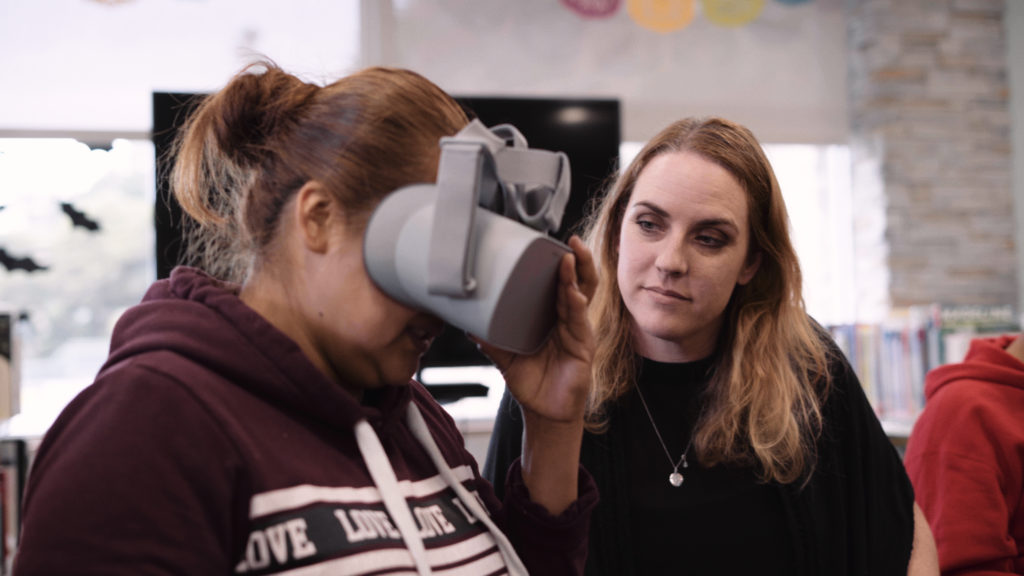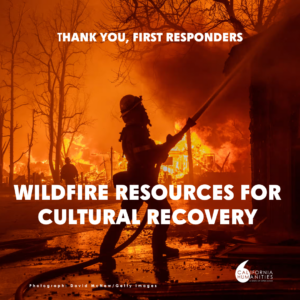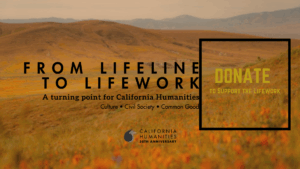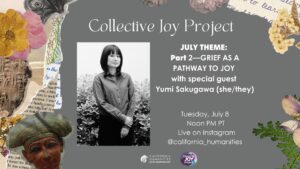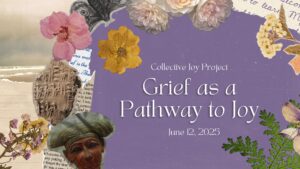At the end of January, ten library staff from across the state gathered at the California Museum in Sacramento to discuss and share the results of their work as part of the 2019 Library Innovation Lab cohort. Throughout the year, they received training, support, and a seed grant to help them research, design, and launch humanities-based programs to engage immigrants in their communities.
As Michelle Meades from Placentia Library District said during the convening, “Status quo cookie cutter programs aren’t what our communities need. We need to make sure programs fit the community rather than the other way around. That’s the whole point of this program.” The resulting projects were truly innovative, reflected each community, and showed us what these libraries can do with a little investment and a lot of inventiveness.
Read on to see some of the highlights from the past year of the Library Innovation Lab.
Libraries Are for Everyone in Fountain Valley
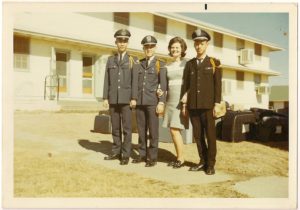
The Fountain Valley Branch of Orange County Public Library used visual storytelling to reflect the immigrant/refugee experience—in particular, Vietnamese immigrants and Vietnamese Americans. Programming over the year ranged from an author talk focused on the refugee experience to a lion dance and drumming performance. Among their successes, the library counted strong community involvement, support from colleagues at other branches, and the ability to reach new audiences—going a long way towards their goal of promoting empathy and understanding on the part of the broader community.
Memories in Motion in Long Beach
The Long Beach Public Library found success with their weekly bilingual storytelling workshops called Cuentacuentos Cafés, creating audio recordings for a digital story collection to be archived in the library’s collection. The program will continue to expand, bringing in undocumented students as storytellers from California State University Long Beach and local high schools. A culminating event, the Tamalada, “brought some people to tears, because it reminded them of home” as attendees shared holiday food traditions from their backgrounds. As Joshua Sanchez, the Project Director from Long Beach said, the project provided, “a lot of food for thought as well as good food.”
Arte Creativo in Placentia
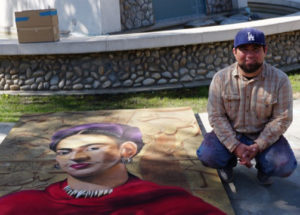
The Placentia Library District set out to discover patrons’ origins and paths to Placentia, record their family histories, and celebrate Hispanic culture. The major events they organized included a Hispanic Chalk Art Festival and a Lotería program in two neighborhoods with large immigrant communities. The library discovered that adults found a lot of value in bringing children to the library programs such as bilingual story time, which is now being offered weekly in response to increased demand.
My City, My Voice in the City of Commerce
The City of Commerce Public Library began their Library Innovation Lab work with community surveys, which ended up informing much more than library programs—respondents included information that proved valuable to city departments including Transportation and Parks. They came up with the theme My City My Voice / Mi Ciudad, Mi Voz with programs that would offer tools for participants to express themselves, learn new skills, and learn about the city. The resulting programs not only increased connections between the immigrant community and the library, but also educated a lot of people—many immigrants didn’t previously know about city services. A local chef offered a mole tasting and spoke about her journey as an immigrant woman opening a restaurant; a local poet led a writing workshop that brought attendees to happy tears; an oral history project invited patrons to be interviewed about their lives; a Day of the Dead program got participants talking about how different cities celebrate the holiday, and more programs. As one of the Library Innovation Lab mentors said, the library, “really spoke the language of the community, not just in terms of Spanish, but in really meeting them where they are at.”
Connecting Cultures in Mid-City Los Angeles

The Washington Irving Branch of the Los Angeles Public Library focused specifically on immigrants from Asian, Latino, and Ethiopian communities—cultural backgrounds that make up a large portion of the diverse population surrounding the branch. An author talk focused on the history of Mexican American immigration was so popular that no one wanted to leave when it was over. An event focused on healthy food choices and a cooking demo included a produce box and cookbook giveaway, which the library held again due to popular demand. Despite having a large Ethiopian community, there was a lack of culturally specific programming in the area, so when the library offered a traditional coffee service and dance performance, many community members showed up enthusiastically in traditional dress and danced along. The event was so popular that it has since been added to a master list of programs available to branches throughout the Library system.
Pásale Paisano: Welcoming Immigrants and Spanish-Speaking Communities in Tulare County
Serving a small community in the Central Valley, the Tulare County Library System’s Exeter Branch Library had remarkable attendance—270 participants over 12 events. Veronica Casanova, Librarian III, grew up in this community, and remarked that she never thought she’d see a Spanish-language movie screening in public, yet through the Library Innovation Lab, was able to bring Pixar’s COCO to an outdoor screening for families. Families converged at a Day of the Dead event, including many non-Latinos, some of whom arrived just to do crafts but stayed after meeting families steeped in the tradition, learning from one another. Graffiti workshops engaged teens in discussions on how they related to the immigrant experience. And the Taste of Oaxaca program brought a speaker representing a collective of Mixteco women who own a restaurant, which Veronica described as “uplifting. The audience’s heads were nodding; people smiled and laughed. They had a connection to the words she was saying.”
A New Community in Cambria
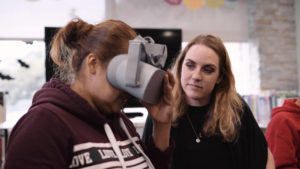
In the Central Coast community of Cambria, the local branch of County of San Luis Obispo Public Library offered bilingual programs to promote increased understanding of the immigrant experience and support the development of a more tolerant community. Most of their events were bilingual and family-focused, aimed at addressing the isolation of Spanish-speakers in Cambria from the rest of the community. A bilingual storytelling event was popular, as was an event focused on family names, which connected children and adults within families. A Ph.D. author spoke on Chicana Motherwork, talking about her hometown and her mother’s unconditional support of her education, to a deeply engaged audience. A virtual reality event allowed immigrants to “visit” their hometowns with the help of a headset. After less than a year of programming, the library has already noticed that patrons connect more to the community.
The Marigold Series in Sunnyvale
This project in the heart of Silicon Valley focused on traditions in Latino and South Asian cultures that both use the marigold as a symbol. The Sunnyvale Public Library held a Día de los Muertos program with an altar and display describing what objects would be used in the tradition, and brought programs to local schools, which the Mayor attended. They also held a Diwali program which brought in over 550 attendees, including staff from the local US Representative’s district, City Council members, and garnered local television and newspaper coverage. While encouraged by the strong response to these programs, the library realized there was a need for more capacity in the future if these programs are to continue.
Immigration Stories in Mill Valley
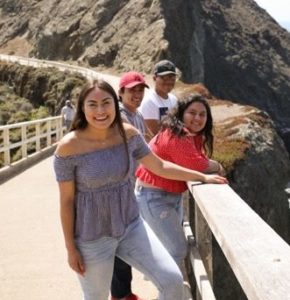
The North Bay Area community of Mill Valley took inspiration from the idea that the humanities are “how people process and document the human experience,” partnering with the MultiCultural Center of Marin. Local Latinx youth organized their own panel, speaking on issues of immigration to an engaged audience. Another event with Pulitzer Prize-winning author Jose Antonio Vargas drew 173 people, who spoke about his experience and nuances within immigration status. The audience wanted to stay long after the event ended, and the publisher of Vargas’ book told the library that it was one of the best events they’d ever had for sales.
This is Who We Are in Napa County
In the wine country community of Napa County, the population is primarily Latino and Caucasian, and the two most commonly spoken languages are Spanish and English, but the Napa County Library noticed a disconnect between these communities. Their goals included bringing more Latino patrons to the library and helping people to get to know their neighbors through their traditions, values, and backgrounds. A salsa recipe contest, a taco fiesta, a COCO screening, cookbook production, and Día de los Muertos altar are among the events they produced through the Library Innovation Lab, with high attendance and multiple requests to bring the events back again.
—
Library Innovation Lab is supported in part by Wells Fargo Foundation and the generosity of individual donors throughout California.

